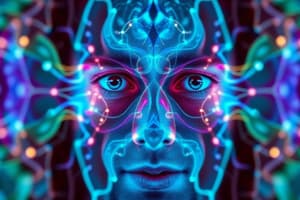Podcast
Questions and Answers
According to the Attribution Theory - Control Hypothesis, how does our perception of control influence our judgment of a person's behavior?
According to the Attribution Theory - Control Hypothesis, how does our perception of control influence our judgment of a person's behavior?
- It decreases sympathy and forgiveness when the behavior is perceived as uncontrollable.
- It depends on the specific excuse given for the problematic behavior.
- It increases sympathy and forgiveness when the behavior is perceived as uncontrollable. (correct)
- It has no effect on sympathy and forgiveness.
How does the perception of being 'born this way' or 'choosing to be gay' affect the favorability towards gay people?
How does the perception of being 'born this way' or 'choosing to be gay' affect the favorability towards gay people?
- Being perceived as 'born this way' leads to less favorable views.
- Being perceived as 'born this way' leads to more favorable views. (correct)
- Being perceived as choosing to be gay leads to more favorable views.
- There is no difference in favorability based on these perceptions.
Based on the text, what kind of excuse is more likely to yield sympathy and forgiveness for problematic behavior?
Based on the text, what kind of excuse is more likely to yield sympathy and forgiveness for problematic behavior?
- An excuse involving something beyond the person's control. (correct)
- An excuse involving external circumstances.
- An excuse involving something controllable.
- An excuse involving internal factors.
According to the Attribution Theory - Control Hypothesis, which type of excuse is more likely to yield sympathy and forgiveness for problematic behavior?
According to the Attribution Theory - Control Hypothesis, which type of excuse is more likely to yield sympathy and forgiveness for problematic behavior?
How does the perception of control influence our judgment of a person's behavior according to the Attribution Theory?
How does the perception of control influence our judgment of a person's behavior according to the Attribution Theory?
How does the belief that someone is 'born this way' affect the favorability towards gay people?
How does the belief that someone is 'born this way' affect the favorability towards gay people?
Explanatory Styles and Attributions involve determining whether a cause is due to something about the individual or other people/circumstances, is present again in the future or not, and influences other areas of their lives or just this one.
Explanatory Styles and Attributions involve determining whether a cause is due to something about the individual or other people/circumstances, is present again in the future or not, and influences other areas of their lives or just this one.
Explanatory Styles and Attributions categorize causes into internal/external, stable/unstable, and global/specific factors.
Explanatory Styles and Attributions categorize causes into internal/external, stable/unstable, and global/specific factors.
Explanatory Styles and Attributions is a theory that focuses on how individuals explain the causes of events and their impact on behavior.
Explanatory Styles and Attributions is a theory that focuses on how individuals explain the causes of events and their impact on behavior.
Explanatory Styles and Attributions categorize causes into internal/external, stable/unstable, and global/specific factors.
Explanatory Styles and Attributions categorize causes into internal/external, stable/unstable, and global/specific factors.
Explanatory Styles and Attributions involve determining whether a cause is due to something about the individual or other people/circumstances, is present again in the future or not, and influences other areas of their lives or just this one.
Explanatory Styles and Attributions involve determining whether a cause is due to something about the individual or other people/circumstances, is present again in the future or not, and influences other areas of their lives or just this one.
Explanatory Styles and Attributions is a theory that focuses on how individuals explain the causes of events and their impact on behavior.
Explanatory Styles and Attributions is a theory that focuses on how individuals explain the causes of events and their impact on behavior.
Study Notes
Attribution Theory - Control Hypothesis
- Perception of control influences our judgment of a person's behavior, where we tend to hold people more accountable for their behavior if we believe they have control over it.
- The more control we perceive someone to have, the more we tend to blame them for their actions.
Explanatory Styles and Attributions
- This theory focuses on how individuals explain the causes of events and their impact on behavior.
- Categorizes causes into three dimensions:
- Internal/external: whether the cause is due to something about the individual or other people/circumstances.
- Stable/unstable: whether the cause is present again in the future or not.
- Global/specific: whether the cause influences other areas of their lives or just this one.
Impact on Social Perception
- Believing that someone is 'born this way' (e.g., being gay) tends to increase favorability towards them.
- Perceiving someone as having control over their behavior can lead to decreased favorability and sympathy.
- Excuses that imply a lack of control (e.g., 'I was born this way') are more likely to yield sympathy and forgiveness for problematic behavior.
Studying That Suits You
Use AI to generate personalized quizzes and flashcards to suit your learning preferences.
Description
Explore the concept of attribution theory and how it influences our perception of others' behavior. Learn about the control hypothesis and how excuses involving factors beyond one's control yield more sympathy and forgiveness. Delve into the impact of attribution theory on the perception of gay individuals.




